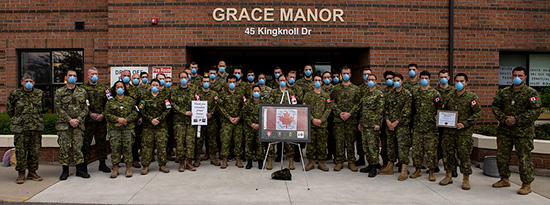Canadian Forces Health Services COVID-19 Response: Successes, Struggles, and Lessons Learned
June 16, 2025 - Defence Stories
Estimated read time - 2:30
Authors:
Dr Jim Kile (Col Ret’d) CD, OMM, MSc MD, CFHS
Yuri Zelenskiy, MD, MPH, MPHI, CFHS, D HS Q&P
Caption
Members of 4 Canadian Forces Health Services Group and the Canadian Armed Forces members that comprise Territorial Battle Group 1 that make up Call Sign 1-1 stand together for a group photo at Holland Christian Homes, in Brampton, Ontario on 25 May 2020, where they supported the long-term care facility during Operation LASER.
Photo: Corporal Justin Dreimanis, 4th Canadian Division Headquarters Public Affairs.
The Canadian Armed Forces (CAF) and Canadian Forces Health Services (CFHS) played a critical role in response to the COVID-19 pandemic, both in Canada and overseas. The Summative Evaluation of the Canadian Forces Health Services Response to the COVID-19 Emergency highlights successes and challenges during the pandemic’s first year, providing key insights to strengthen future preparedness and resilience.
The evaluation confirms that CFHS successfully delivered on its mandate throughout all phases of the COVID-19 pandemic: maintaining operational capability; sustaining CAF missions, including Operation (Op) LASER, the CAF’s response to a worldwide pandemic situation; and ensuring essential services and force readiness during the crisis.
The report, produced in accordance with Op LASER—activated by the Chief of the Defence Staff—and commissioned by the Directorate of Health Services Quality & Performance, was undertaken at the direction of the Surgeon General through the CFHS Quality Council. It examined CFHS’s performance in three key areas: in-garrison care, support for deployments, and assistance to civil authorities. CFHS’s response was assessed against four criteria—effectiveness, efficiency, governance, and Gender-Based Analysis Plus (GBA+) integration—using a mixed-method approach that analyzed 118 interviews, 31 focus groups, five site visits, and over 150 documents. This report is a critical tool for governance, accountability, and continuous improvement.
One of the report's major findings is that CFHS effectively safeguarded the health and safety of CAF personnel, ensuring operational readiness throughout the pandemic. Clinics swiftly implemented public health measures to control infection, allowing essential services to continue uninterrupted. CFHS also provided medical support to Joint Task Forces operating in Canada and abroad.
The evaluation does identify several areas for improvement. Notably, the absence of a detailed and up-to-date medical contingency plan left CFHS in a reactive posture, requiring significant organizational effort to adapt to rapidly evolving circumstances. Pre-existing challenges, such as resource shortages and outdated governance structures, further strained the system.
The findings highlight the distinct challenges faced by medical and dental services. Medical teams bore a heavier burden in maintaining essential services, especially during the pandemic's initial six months.
Despite these obstacles, CFHS personnel at all levels showed remarkable resilience, developing innovative solutions to meet the demands of the crisis. However, the prolonged surge in workload came at a considerable cost to frontline workers – including emotional, physical and mental burnout in some cases. The report warns that CFHS will face significant challenges in recovering from this extended period of heightened activity, specifically regarding personnel attraction and retention.
The evaluation has generated 22 recommendations aimed at strengthening CFHS's preparedness for future health emergencies. These include updating contingency plans, addressing resource gaps, improving governance structures, and further integrating GBA+ to ensure diverse perspectives are considered in crisis response planning.
Ultimately, the report underscores the importance of learning from these experiences to build a more resilient health service, capable of facing future emergencies with greater efficiency and effectiveness.
